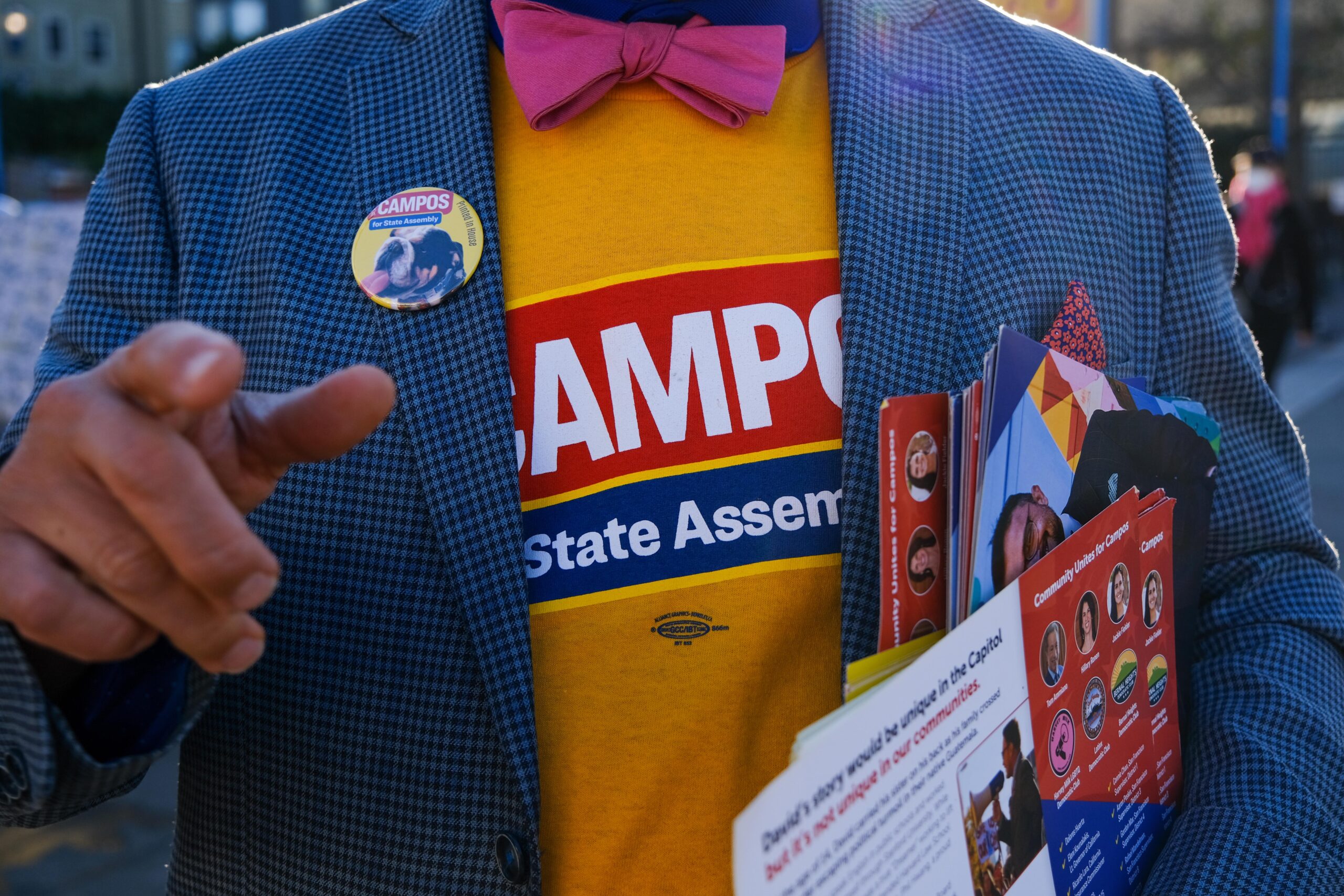He says it in every speech and plasters it all over social media. It’s even part of his logo. David Campos, a candidate for Assembly District 17, says he’s “corporate free.” With early voting already open in the AD-17 race, we wanted to know: What does that really mean?
Campos doesn’t accept money from any corporation or LLC, taking only from individuals, labor unions and issue-based political organizations like political action committees. It’s a relatively unique strategy for a state Assembly race, where most California lawmakers are funded at least in part by corporate contributions.
Campos has said he wants to set himself apart from the field so he’s not beholden to corporations if elected. The Standard confirmed Campos has no corporate contributions to date.
But he does accept money from corporate executives, among the largest amounts from Seven Hills Properties, Maximus Real Estate and Fortune Players Group, Inc., which may be undermining his message, said campaign finance expert Nick Warshaw, a lawyer at Loeb and Loeb.
“It literally makes him corporate-free but the question is: What is he trying to convey by not taking corporate money?” said Warshaw. “Usually people are saying the meaning is, ‘I’m not influenced by corporations.’ But if you’re being supported by an executive of that corporation, it’s a little bit more challenging of an argument to make.”
As for Campos’ opponent, Matt Haney, The Standard identified 37 corporations that have contributed a total of nearly $60,000 to Haney’s campaign as of Tuesday. Of those corporations, 10 were food or alcohol-related small businesses like restaurants (Kaiyo) and bars (Maggy McGarry’s). Corporate contributions make up less than 5% of Haney’s contributions.
Twelve were in the real estate industry, ranging from a local cabinet contractor to the megadeveloper behind the $160 million 1066 Market St. development. Three were cannabis businesses. In addition, John Edward (Jed) York & Affiliated Entities, Including the Forty Niners Football Company LLC contributed $2,000 and SFBSC Management, LLC, the company that owns many of the strip clubs in San Francisco, contributed $3,000.
Campos’ campaign suggested Haney’s support from developers, real estate interests and “opponents of Medicare for All” could influence Haney’s decision-making at the state level.
While Campos doesn’t take money from businesses directly, his campaign does accept money from PACs—although Haney’s approximately $375,000 in PAC money dwarfs Campos’ approximately $65,000 raised from PACs.
To Haney, the difference between his campaign and Campos’ is negligible. He points to contributions to Campos’ campaign from real estate interests like high-level officials at Seven Hills Properties and Maximus Real Estate, money from people representing gambling groups like Fortune Players Group and leaders at Double AA Corporation, which runs gas stations.
“It’s incredibly disingenuous and cynical for him to say he’s corporate-free when so much of his backing has come from corporate and executives and interests,” Haney said. “He is drawing this imaginary line between who is backing him and who is backing me that simply doesn’t exist.”
Campos declined multiple requests for an interview for this story. In a statement to The Standard, his campaign manager, Daniel Anderson, wrote that the campaign is using the same “corporate-free” label pioneered by Bernie Sanders.
Campos’ campaign expressed outrage over $45,000 in contributions Haney had to return because the money violated ethics rules that don’t allow sitting city representatives to ask for or accept contributions from people and businesses that have or could soon have contracts with the city. This includes developers.
Haney’s campaign said it returned each of the illegal contributions within a reasonable amount of time after realizing they violated ethics rules, adding they have not been contacted by the city’s ethics commission about any violations. Haney told The Standard he and his campaign did not solicit any of the illegal contributions, which were submitted through their website where contributors are asked to self-attest that they don’t have any conflict of interest with the campaign.
Campos’ campaign said the high number of contributions that had to be returned raises a red flag—as does the fact that Haney’s campaign accepted them in the first place.
“What is clear is that Haney—who once ran as a progressive—now embraces a landlord and developer agenda,” Anderson wrote. “We think it is a fair question to ask if this 180-degree change was influenced by his donors—illegal and otherwise.”
With San Francisco’s stricter campaign finance laws and enforcement, Warshaw—who has significant campaigns finance experience—said it’s not uncommon for campaigns to have to return contributions. But to avoid even a perception of an ethics violation, they usually try to reject them on the front end before they make it into campaign finance reports. But in the case of unsolicited contributions, that’s not always possible.
“There’s not much more you can do than make it clear—and then when the contributions come in, check it and refund it,” Warshaw said.
Campos’ campaign argues that simply returning the contributions isn’t enough.
“Voters understand the game politicians play,” Anderson wrote. “They make promises during campaigns but then make excuses once they are elected. Why? Follow the money.”
